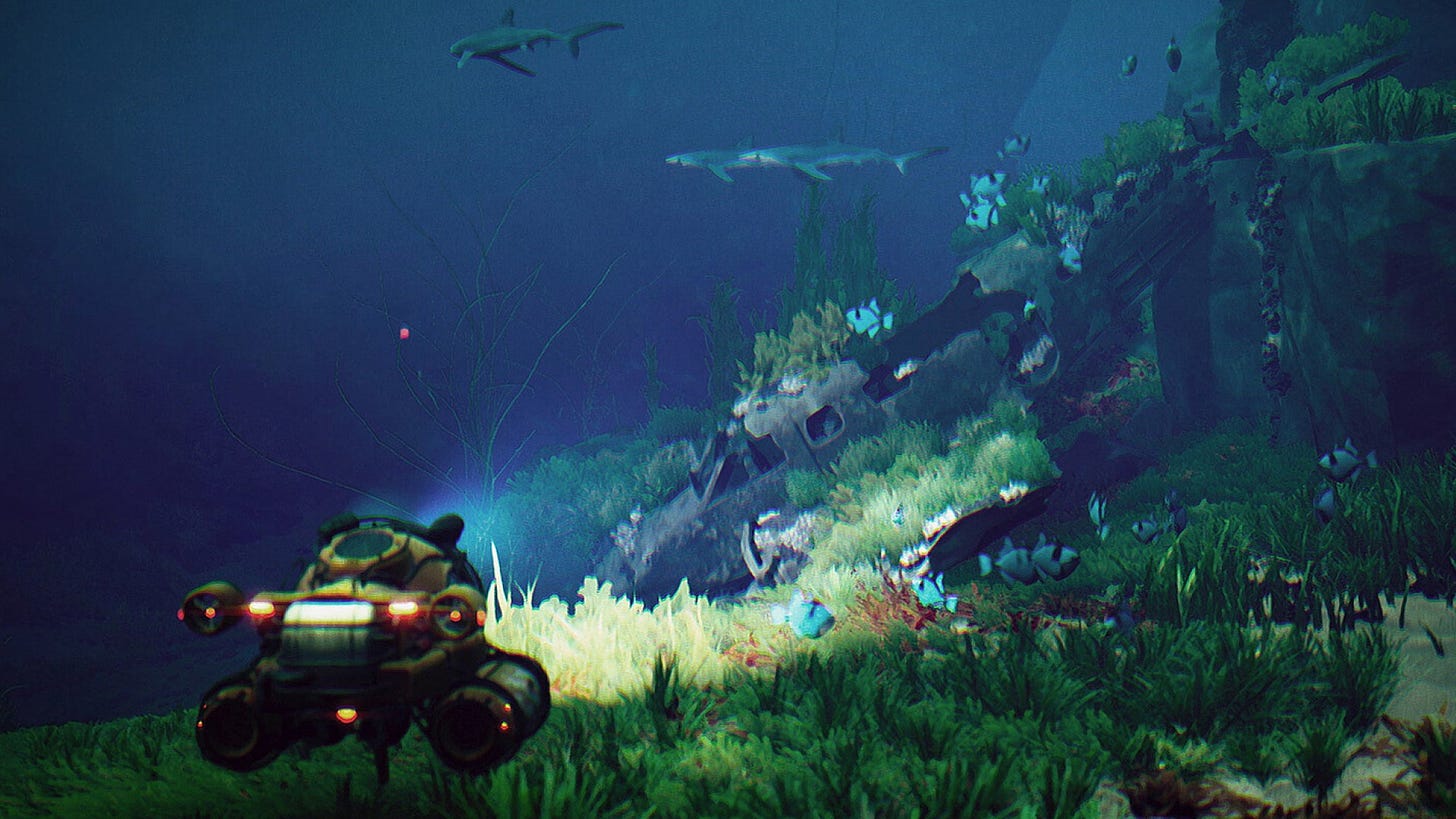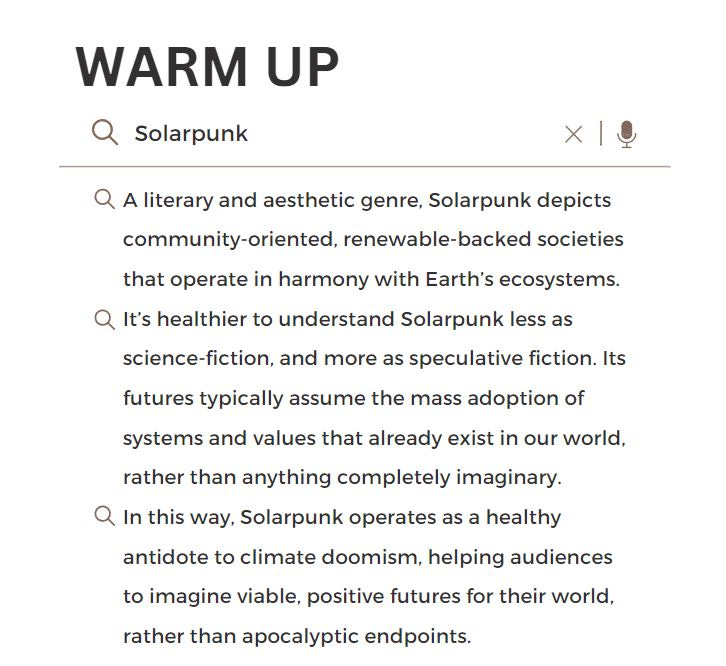
Discover more from Play Anthropocene
The case for subtext at the end of the world
Your latest digest of video game and climate change news from the past two weeks.
Welcome to the latest edition of Play Anthropocene!
Today is Tuesday, September 5th, and we’re covering the latest developments in the world of video games and climate change. Happy reading!
Xbox wins a well-deserved Green Studio of the Year award
Amidst a backdrop of planned and unplanned surprises, Gamescom 2023’s Opening Night Live event dedicated a full segment of its two hour show to the games industry’s sustainability efforts, complete with a surprise appearance from a prolific studio head.
Playing for the Planet’s Lisa Pak took to the stage to award the first ever “Green Studio of the Year Award” to Xbox, which beat out other nominees Ubisoft and Frontier for that year. Phil Spencer, characteristically on-brand in an Xbox sustainability t-shirt, seemed pretty chuffed to be accepting a trophy (or should that be Achievement?) on behalf of his team, especially in an era when big wins for Xbox have been pretty thin on the ground across other industry celebrations.
Putting aside the semantic debate as to whether Xbox technically constitutes a studio or not (it’s a company housing game development, so I’m in the “Yes” camp), you have to admit that the team’s efforts this year have been really impressive, especially compared against its competitors operating at the same level. To recap…
In January, Xbox rolled out a patch to the Series S/X with several sustainability features, such as “carbon aware downloads”, and an “energy saving” power mode which shuts down the console almost entirely when turned off.
Then, in March, 343 Industries led a GDC talk sharing learnings on how the studio created a more energy-efficient AAA title in Halo Infinite, with Xbox also launching a bespoke energy and carbon tracker toolkit for developers to directly measure the energy efficiency of their games in real-time.
Over the Summer, Epic Games worked with Xbox to use this same toolkit to reduce the energy demand of Fortnite, one of the biggest games in the world.
In August, Xbox started selling modular parts for Xbox controllers, enabling customers to repair their broken gamepads, rather than having to buy a new one outright. Xbox also released its energy-efficiency guidelines; an industry-leading set of measures and recommendations that studios and publishers can follow to reduce the energy consumption of their games.
As far as sustainability records go, that ain’t a half bad one.
That being said, I hope Spencer and his team considers this award as a renewed challenge to go further, rather than a glorified pat on the back, as Xbox still has plenty of work to do. As also reported in Play Anthropocene over the last few months, Microsoft has been struggling to significantly bring down its GHG emissions, hampering the company’s ambitions for carbon-negative status by 2030. Meanwhile, Xbox’s launch of a new controller partly made of PCR materials to celebrate Earth Day felt less like a genuine pivot towards circular economy thinking, and more of a modest (albeit well-intentioned) marketing play.
Bigger picture, it’s also great to see this kind of award get recognised and supported by the industry at this level, especially as a way to spotlight the smaller, independent studios doing incredible work in sustainability with each and every year. Given the year Xbox has had, it makes sense for this award to have gone to its team for 2023, but going forward, I’m excited to see how Green Studio of the Year can also act as an important platforming vehicle for the grassroots changemakers operating at all levels of the industry, especially those who are continually raising the bar for best practice from the bottom up.
Under the Waves takes video game climate messaging to new depths
Under the Waves, the new narrative adventure title from Parallel Studio and publisher Quantic Dream, hit shorefro-… sorry storefronts last week, and is already giving After Us and Terra Nil a run for their money as one of the most explicitly eco-thematic titles of the year.
The game takes place in an alternative version of the 1970’s, where professional diver Sam is running from his past by working a long-stay gig under the Atlantic ocean for oil conglomerate UniTrench. As Stan continues to monitor UniTrench’s work, and discover first-hand the consequences of their presence in this marine habitat, Under the Waves morphs into a concientious parable about our extractive relationship with one of Earth’s most treasured resources.
In an effort to authentically present an ocean under threat from the impacts of human interference, Parallel partnered with The Surfrider Foundation, a grassroots environmental network, to consult on the development of Under the Waves, and the organisation even features directly within the story of the game itself.
I reviewed the game for GamesRadar+ last week, and while I really admired Parallel’s effort to bring the work and mission of Surfrider right to the forefront of Under the Waves story, it also results in a narrative with all the subtlety of an industrial-grade deep sea trawler. Here’s what I said about this problem over there:
Many of these facts [about ocean pollution] are communicated via Stan's own personal diary logs, where he manages to somehow list off hard numbers about habitat loss and microplastics from memory, acting less like the character of his own story, and more as a vehicle for Parallel's desire to educate the player. It all makes for a feeling of slightly overwritten messaging.
It’s the Garth Marenghi problem, essentially, but part of me wonders whether I’m also not the target audience for Under the Waves’ uniquely explicit brand of ‘edutainment’ style homily. Subtext often makes for a richer, more rewarding story, certainly, but in the case of the climate crisis, shouting from the rooftops is arguably a a more appropriate response to everything that’s going on. And perhaps some audiences really do need storytellers to shout in their ear, regardless of the impact it might have on the tone and tenor of the narrative itself.
In any case, even with its slightly ham-fisted approach to raising awareness about the plight of our oceans, I still enjoyed my time with Under the Waves. There’s something to be said about its smart blend of allegorical storytelling and isolating open world exploration, particularly in the way both of these help to visualise the consequences of offshore drilling upon the flora and fauna of its dazzling ocean play space. Just don’t expect too much from it in the way of subtlety.
Loftia is the latest Solarpunk title to smash its Kickstarter targets
A little over two months since Cyberware’s Solarpunk received overwhelming support on Kickstarter, yet another experience set within the genre of that game’s title has enjoyed equally promising crowdfunding success.
Developed by two-person Australian team Qloud Games, Loftia describes itself as a “cozy online game set in a warm, solarpunk world”, in which players can farm, craft, build, and explore in a future that runs entirely on renewable energy and sustainable agriculture.
Now, I’m sure some of you will remember that a previous Play Anthropocene from June arrived in your inboxes proclaiming death to the cosy farming simulator, but do hear me out before you start sharpening the pitchforks. As it happens, I think titles like Loftia go a long way in addressing the issue I originally discussed in that newsletter two months ago.
Instead of idealising contemporary farming as the pastoral ideal, Loftia - alongside many other Solarpunk forms of speculative fiction - looks ahead to an alternative future for the profession, one untethered from the pressures of intensive agriculture and the ceaseless capitalist churn pushing the industry to its brink.
In other words, Qloud Games finds the “coziness” of farming in a future where players can enjoy the meditative ambience that the genre is known for, precisely because their farms are working at a more sustainable rhythm in harmony with their surroundings. It’s perhaps a quixotic presentation of a viable future that, for some, will likely border on the utopian, but I find it to be a much healthier perspective to indulge than one which perpetuates the image of contemporary farming as care-free and completely self-sustaining.
I’m not the only one who has taken a shine to the game, either. Loftia has received over £800,000 in funding on an initial target of £118, 000, showing once again the tremendous amount of appetite for imagined futures that show the possibilities of where we could be if we changed course, rather than what will be if we don’t.
Better yet, thanks to reaching those milestones, Qloud Games can now implement additional systems into the game for launch, such as a Bug Booster feature that allows players to work with bug species to create yield-boosting eco-systems, and an Animal Conservationist mode in which you can “help with the rescue and reintroduction of endangered species” to your farm. Get in.
Enjoyed this newsletter? Subscribe or spread the word about Play Anthropocene to others who might be interested, and if you have any feedback or questions, feel free to get in touch with me at PlayAnthropocene@gmail.com
Find me on Twitter: @alexavard95












